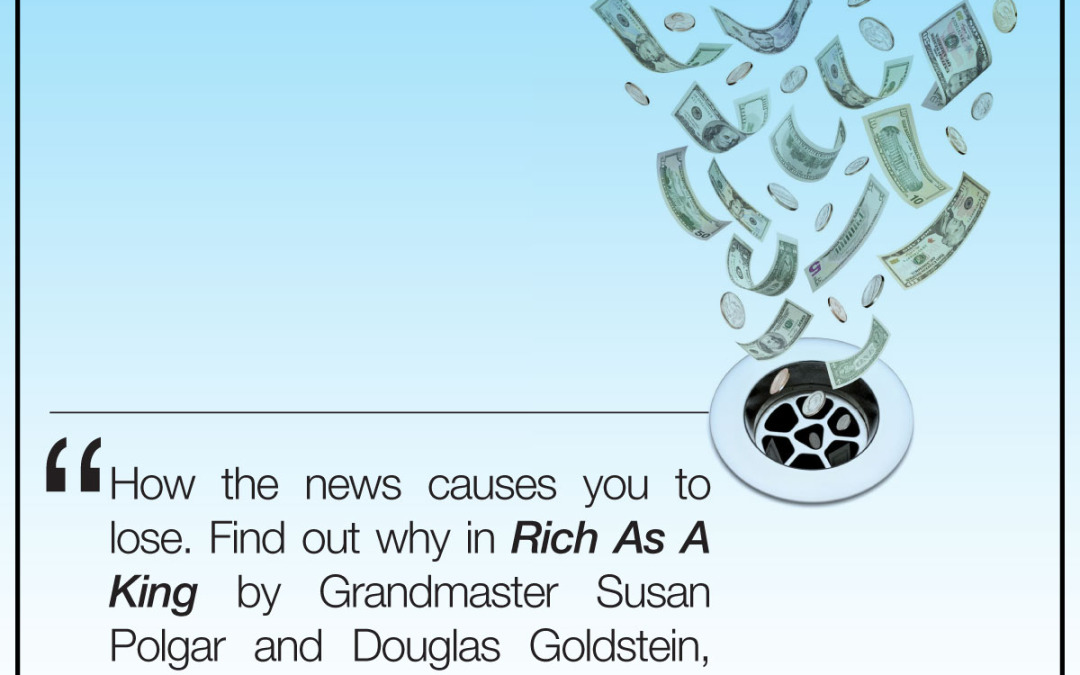
by Doug Goldstein CFP® | Feb 5, 2015 | Behavior finance, Decision Making |
Do you suffer from information overload? In the current era of social media and high-tech communications, many investors hunt for information on line, mining endless research reports, websites, and blogs. But you shouldn’t believe every single thing that you read. (Except for this post J) Just because something is in print or online doesn’t make it true. Of course, that doesn’t mean that all of the news is tainted. Many media outlets provide worthy data to analyze. But sometimes people relate to this information in the wrong way. Suffering from “media response,” they feel the need to react, which is too bad, since the low correlation between current events and long-term performance, compounded by a deluge of information, causes stress and often leads to poor financial decisions. The urge to “do something” when you receive new facts can cause suboptimal results in your investing. For some reason, doing something feels better than sitting tight. Although you should consider the big picture, don’t allow yourself to get overwhelmed by information overload. When playing chess, don’t fixate on winning the game; think instead which move will improve your current position the most. And when you are selecting investments, don’t get preoccupied with how each choice may affect your ability to pay for your child’s tuition or fund your retirement. Instead, confirm that the type of investment fits into your asset allocation model, and then look closely at the specific security to make sure that it makes sense for you. Sometimes you must work on your big picture decisions, and sometimes on your tactics. Don’t let an outside influence, especially one as... Click for more
by Doug Goldstein CFP® | Jan 8, 2015 | Behavior finance |
There are two ways of seeing the world: You can look at the small details, possibly missing the larger picture. This is often called mental accounting. Or, you could only look at the larger picture, possibly missing important details. This is often called the illusion of attention. In The Invisible Gorilla, authors Christopher Chabris and Daniel Simons give various examples of what they refer to as “the illusion of attention.” Sometimes, even experts overlook major hazards, such as an experienced airline pilot not noticing a plane on a runway when he was about to land, or a radiologist missing a guidewire inside a patient’s chest. The reason why many intelligent people can make what sound like such foolish mistakes is simply because they are not expecting to find such impediments. Relating this idea to finance, armchair portfolio managers will also miss critical information, even if the news screams facts in a headline. What’s the solution to not miss something important? The best solution for avoiding the illusion of attention or mental accounting is not to rely purely on your own perceptions. Get an extra set of eyes to review your statements. Sit with your spouse, trusted friend or family member, or professional advisor to go over your affairs. Having an objective viewer offer insights helps to ensure that you don’t miss a crucial element on your money... Click for more
by Doug Goldstein CFP® | Dec 22, 2014 | Behavior finance, Decision Making |
The most important asset for a young investor is time. If you are just starting out in the work world, the idea of investing may seem overwhelming. Your thoughts are most likely on your immediate needs, not decades ahead. While retirement seems far away – that far off point in the future is what is working in your favor. At this time in your life, your nest egg, if you have one, is small. You may not have much money at this point, but you do have time. Therefore, if you invest and sustain a loss, you have the time to recoup and get ahead. Older people, closer to retirement, don’t have this luxury and need to invest more conservatively. Remember: Time is on your side, so feel free to take appropriate risks. To learn more about how not to make a bad investing move, read this.... Click for more

by Doug Goldstein CFP® | Dec 3, 2014 | Behavior finance, Financial Strategies |
Dave Ramsey’s ‘Debt Snowball’ hits the target Being in debt is rarely a good idea, and even if you have just a limited number of obligations, it’s wise to start paying them off before they snowball out of control. The debt snowball Dave Ramsey, one of the most straightforward financial gurus that you’ll find online, teaches that you should use the “debt snowball” to pay off your debts. This means listing all of your debts, apart from the mortgage on your house, in ascending order. Then you start paying off each debt, starting with the smallest and moving forward. The sense of accomplishment that you’ll feel as you pay off a small debt should motivate you to move forward and pay off the larger ones until you are hopefully debt free. These small, but steady steps are like a pawn inching his way across the chessboard, waiting to be traded into a greater piece. There is nothing as strong as determination and plodding ahead, steadily, paying off debt, to propel you to a better financial position. Prevention is better than cure The best way to deal with debt is to stop it from happening in the first place. But all too often people are sucked into debt by something that appears like a great deal. Being told to buy 2 and get the 3rd one free, is enticing, but how many shoes did you set out to buy? It is easy to fall into the false allure of special offers, and before you know it, you are saddled with a bunch of needless expenses. On page 240 of Rich... Click for more
by Doug Goldstein CFP® | Nov 26, 2014 | Behavior finance, Decision Making |
Logical decision making is a crucial part of investing. But many investors often find themselves driven by emotion rather than logic. For example, the fear of losing, known as “loss aversion,” may tie an investor’s hands and lead him to make poor investment choices. And what about the “disposition effect,” where investors mistakenly hold onto their losers and sell their winners? Thinking like an economist when managing your money is more likely to make you a winner than if your decisions are based on fear or greed. For more tips on how to think like an economist, click... Click for more
by Doug Goldstein CFP® | Nov 24, 2014 | Behavior finance, Decision Making |
Although it may seem that you can’t go wrong if you don’t take a risk, this is not always true. Sometimes, you can end up actually losing by being too safe. The concept of risk refers to the potential loss incurred by any move that you take. Therefore, if you never take a risk, in theory you will never lose anything. The downside of this way of thinking is that you will never gain anything either. For example, when you come to a busy road, if you don’t cross it then there’s no chance that you’ll be run down by a speeding car. But you also won’t reach that pot of gold that’s waiting just for you on the other side. To gain the most from whatever decision you make, strike the balance between what you may end up losing and what you may gain. Measure your risk tolerance – how much you can afford to lose – as well as the potential gain that you could earn from making a specific move. Don’t forget: Pearls don’t lie on the seashore. If you want one, you must dive for it. -Chinese proverb To find out more about what happens if you play too safe, click... Click for more






